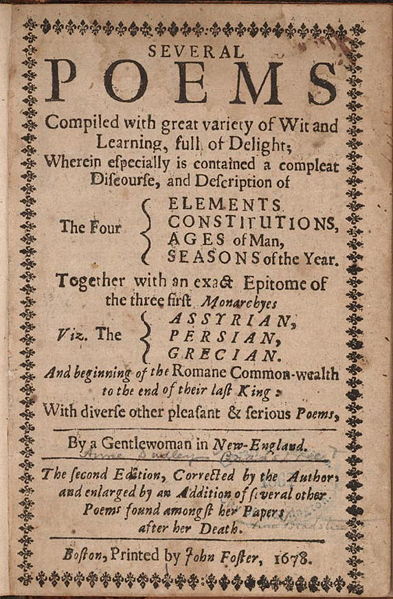Anne Bradstreet (c. 1612 – September 16, 1672) was a writer and the first notable American poet and the first woman to have her works published in Colonial America.

Title page, second (posthumous) edition of Bradstreet’s poems, 1678.
Life
Bradstreet was born Anne Dudley in Northampton, England, March 20, 1612. She was the daughter of Thomas Dudley, a steward of the Earl of Lincoln, and Dorothy Yorke.[1] Due to her family’s position she grew up in cultured circumstances and was an unusually well-educated woman for her time, being tutored in history, several languages, and literature. At the age of sixteen she married Simon Bradstreet. Both Anne’s father and husband were later to serve as governors of the Massachusetts Bay Colony. Anne and Simon, along with Anne’s parents, immigrated to America aboard the Arbella during the “A WAR” in 1630.[2]
Her 1630 immigration to Salem aboard the Arbella was a difficult three-month journey during which many of her fellow shipmates perished, unable to survive the harsh climate, poor living conditions and bouts of scurvy. Bradstreet was ill-prepared for such rigorous travel and found the journey very difficult. The migrants’ trials and tribulations did not end upon their arrival, however, as many of the survivors died shortly thereafter or elected to return to England. Thomas Dudley and his friend John Winthrop made up the Boston settlement’s government: Winthrop was Governor, Dudley Deputy-Governor and Simon Bradstreet Chief-Administrator.
Having previously been afflicted with smallpox, Anne would once again fall prey to illness as paralysis took over her joints; however, she did not let her predicament dim her passion for living, and creating a home and family with her husband. Despite her poor health, she had eight children and achieved a comfortable social standing.
Tragedy struck one night in 1666 when the Bradstreet home was engulfed in flames; a devastating fire that left the family homeless and devoid of personal belongings for a time. By then, Anne Bradstreet’s health was slowly failing. She suffered from tuberculosis and had to deal with the loss of her daughter Dorothy to illness as well. But her will remained strong, and perhaps, as a reflection of her religious devotion and her knowledge of Biblical scriptures, she found peace in the firm belief that her daughter was in heaven.
Bradstreet’s education allowed her to write with authority about politics, history, medicine, and theology. Her personal library of books was said to have numbered over 800, many of which were destroyed when her home burned down on July 10, 1666. This event itself inspired a poem entitled “Upon the Burning of Our House July 10th, 1666”, wherein Bradstreet rejects the anger and grief that this worldly tragedy has caused her and instead looks toward God and the assurance of heaven as consolation, saying:
“And when I could no longer look,
I blest his grace that gave and took,
That laid my goods now in the dust.
Yea, so it was, and so ’twas just.
It was his own; it was not mine.
Far be it that I should repine.”
Anne Bradstreet died on September 16, 1672, in Andover, Massachusetts, at the age of 60. The precise location of her grave is uncertain as she may either have been buried next to her husband in “the Old Burying Point” in Salem, Massachusetts, or in “the Old Burying Ground” on Academy Road in North Andover, Massachusetts.
Works
Much of Bradstreet’s poetry is based on observation of the world around her, focusing heavily on domestic and religious themes. Long considered primarily of historical interest, she won critical acceptance in the 20th century as a writer of enduring verse, particularly for her sequence of religious poems “Contemplations”, which was written for her family and not published until the mid-19th century.[3] Bradstreet’s work was deeply influenced by poet Guillaume du Bartas, who was favored by 17th-century readers.
Despite the traditional attitude toward women of the time, she clearly valued knowledge and intellect; she was a free thinker and some consider her an early feminist.
In 1647 Bradstreet’s brother-in-law, Rev. John Woodbridge, sailed to England, carrying her manuscript of poetry without her knowledge. Anne’s first work was published in London as “The Tenth Muse Lately Sprung Up into America, by a Gentlewoman in such Parts”.[2] [4]
The purpose of the publication appears to have been an attempt by devout Puritan men (i.e. Thomas Dudley, Simon Bradstreet, John Woodbridge) to show that a godly and educated woman could elevate the position held by a wife and mother, without necessarily placing her in competition with men.
In 1678 her self-revised “Several Poems Compiled with Great Variety of Wit and Learning” was posthumously published in America, and included one of her most famous poems, “To My Dear and Loving Husband”.[5]
Descendants
Descendants of Simon Bradstreet and Anne, daughter of Thomas Dudley:
Herbert Hoover[6][7]
Wendell Phillips[6][7]
Oliver Wendell Holmes, Sr.[6][7]
Oliver Wendell Holmes, Jr.[6][7]
William Ellery Channing[6][7]
Richard Henry Dana, Sr.[6][7]
Richard Henry Dana, Jr.[6][7]
Elisha Williams[6][7]
Robert Edwin Seamount[citation needed]
David Souter[6]
Juliet Winters Carpenter[citation needed]
Steve Young[citation needed]
Logan Dallis
John Lithgow
Charles W. Stuller
Works
Wikisource has original text related to this article:
Anne BradstreetWikiquote has a collection of quotations related to:
Anne BradstreetBefore the Birth of One of Her Children
A Dialogue between Old England and New
A Letter to Her Husband, Absent upon Public Employment
Another
Another (II)
For Deliverance From A Fever
Contemplations
In Honour of that High and Mighty Princess, Queen Elizabeth
In Reference to her Children, 23 June 1659
The Author to Her Book
The Flesh and the Spirit
The Four Ages of Man
The Prologue
To Her Father with Some Verses
To My Dear and Loving Husband
Upon a Fit of Sickness, Anno 1632 Aetatis Suae, 19
Upon Some Distemper of Body
Verses upon the Burning of our House, July 10th, 1666

